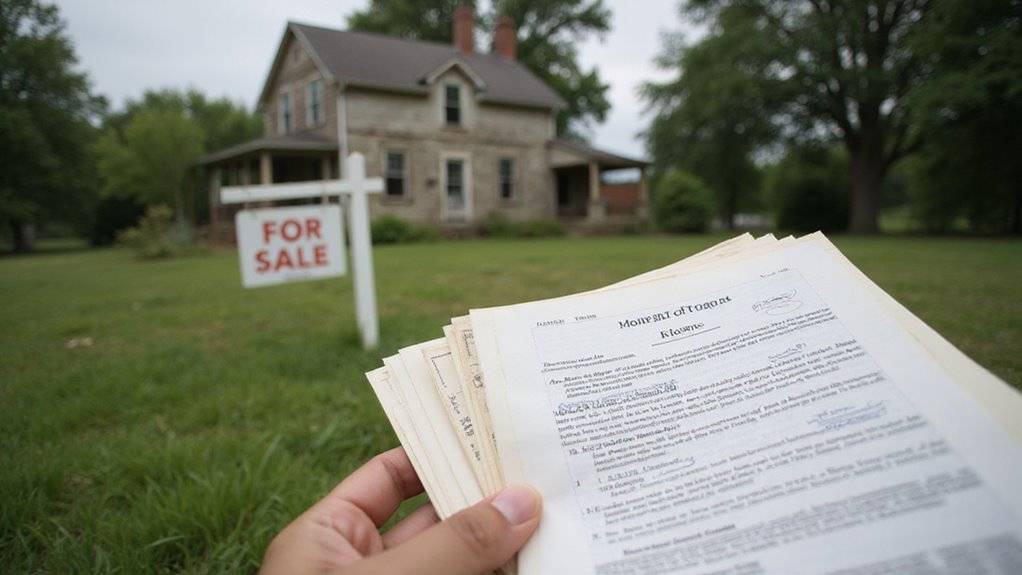Selling a house in Virginia is usually a big step, but title issues can make it much harder. Problems like unpaid liens or unclear ownership can scare buyers away. These issues can also cause delays and add extra stress to the process.
Title problems do not just slow things down. They can cause deals to fall apart at the last minute. If you ignore these problems, you might face legal trouble or lose money. Yes, you can sell a house with title issues in Virginia, but you must handle the challenges carefully.
The good news is that there are solutions, like clearing up liens or making full disclosures. Legal help and honest communication can protect you and keep the sale on track. This blog will guide you through each step to help you sell your house, even with title problems.
Key Takeaways
- Yes, you can legally sell a house with title issues in Virginia, but the process is often more complex and may face delays.
- Resolving title issues early—such as unpaid taxes, liens, or boundary disputes—can prevent sales delays and legal complications.
- Full disclosure of known title problems is required by Virginia law, and concealing defects risks legal liability or contract rescission.
- Title issues may reduce your property’s value, limit buyer interest, or require price negotiations to close a sale.
- Working with a real estate attorney and title company helps resolve title problems and ensures a smoother, legally compliant transaction.
Understanding What Constitutes a Title Issue

A title issue in Virginia is any problem that affects your legal right to transfer your home. Common title issues include defects, claims, or mistakes with ownership. If you want a smooth sale, your title must be clear.
Legal problems like liens, judgments, or disputes over ownership can block the sale. If public records have mistakes or a document is filled out incorrectly, that can also be a title issue. Even small clerical errors may cause trouble. Checking for liens and encumbrances early helps prevent surprises during the sale process.
You should check your property’s title history before you try to sell. If you find any issues, resolve them early to avoid delays. Overlooking these problems could lead to legal trouble or a failed sale. Title resolution is essential to ensure a successful transfer of ownership.
Common Types of Title Problems in Virginia
When you’re preparing to sell in Virginia, you must address title complications such as unresolved liens and judgments, boundary or survey disputes, and the presence of missing heirs or owners. Each of these issues can cloud your title and restrict your ability to transfer clear ownership.
Understanding how these problems arise and impact your legal obligations is crucial for a compliant transaction. Additionally, property condition can influence the severity of title issues and the ease of resolving them, especially when repairs or structural concerns are involved. Working with knowledgeable professionals who understand local real estate laws can help navigate these complicated issues more smoothly.
Unresolved Liens and Judgments
Unresolved liens and judgments can stop you from selling your property in Virginia. These issues must be fixed before the sale can go through. If you ignore them, you cannot legally transfer ownership.
A lien is a legal claim on your property, not just against you. Common liens come from unpaid taxes, contractor bills, or court judgments. Buyers’ lenders will find these problems during a title search.
Virginia law requires you to pay off or settle all liens and judgments before closing. If you do not resolve them, the sale will not happen. The closing process will pause, and buyers may decide to leave.
Boundary and Survey Disputes
Boundary and survey disputes are common title problems for Virginia homeowners. These issues can stop or delay the sale of your property. If you plan to sell, you must resolve all questions about your property lines.
Unclear boundaries may scare away buyers or cause closing delays. Old deeds or vague property descriptions often create confusion. A recent, certified survey is usually needed to clear up any doubts.
If there are disputes about your property lines, you could face legal action. Encroachments, such as fences or buildings crossing the line, may need removal or a legal agreement. Survey differences between documents must be fixed before a sale can go through.
Missing Heirs or Owners
Title issues involving missing heirs or owners often stop real estate sales in Virginia. If you cannot find all owners, you cannot transfer the property. Virginia law says every owner must agree to the sale.
If the owner died without a will or clear plan, heirs may not be easy to find. Unidentified heirs create confusion about who has the right to sell. This makes buyers and lenders cautious.
If some heirs or owners are missing, you may have to go to court. A quiet title action or special commissioner may be needed. Until the court settles ownership, you cannot guarantee a clear title.
If the title is not clear, most buyers and lenders will not move forward. You must resolve missing heirs or owners before selling. This process can take time and may involve extra legal steps.
How Title Issues Affect the Home Selling Process
Title problems can slow down or stop the home selling process. If a title is not clear, you cannot transfer ownership legally. Buyers and lenders may not move forward unless title issues are fixed.
Unresolved title disputes can delay or cancel the closing. Legal fees may increase if you need to fix ownership records. Buyers might lose confidence and back out or ask for new terms.
Virginia law requires a clear title for a home sale. Liens, missing signatures, or boundary issues can stop the sale. If you solve these problems early, you can avoid delays and legal trouble.
Ensuring proper disclosure of defects can also help maintain buyer trust and prevent future disputes. Addressing title deficiencies promptly can help streamline the sale process and reduce potential legal complications.
The Role of Title Insurance in Virginia Real Estate

Title insurance protects people in Virginia real estate deals from problems with property ownership. It covers issues like unknown heirs or mistakes in public records. Buyers and sellers both benefit from this protection.
Virginia law does not require title insurance, but it is highly recommended. If you want to avoid financial risk, you should get it. Proper documentation and clear titles are essential for a smooth transaction, and title insurance helps ensure these standards are met. Title insurance helps make selling a home easier and safer.
The policy gives buyers confidence that their purchase is secure. It also helps sellers avoid future legal disputes over ownership. If a title problem comes up later, the insurance company handles the costs.
Title insurance also provides peace of mind by covering potential claims that could arise after closing, ensuring the transaction remains secure for all parties involved.
Liens: What They Are and How They Impact Your Sale
A lien is a legal claim on your property. It can stop or delay your sale in Virginia. Buyers and lenders want a clear title without any liens.
Liens are claims from unpaid debts. These often come from unpaid property taxes, contractor bills, or old mortgages. Each lien must be settled before selling your property. Ignoring liens can lead to title clearance issues that complicate the sale process.
If you ignore liens, you may face legal and financial trouble. You could risk breaching your contract. Always resolve liens before closing the sale. Addressing title issues promptly can help ensure a smooth transaction.
Boundary Disputes and Their Effect on Property Transactions

Boundary disputes can make selling property in Virginia difficult. These disputes create confusion about where property lines are located. If property lines are not clear, selling or buying property becomes more complicated. Clarifying property boundaries often requires expert surveyor assessments, which can add time and expense to the process. Title issues often come up during a boundary dispute.
Buyers may not get a clear title, and lenders might reject loan applications. Title insurance companies could also refuse to provide coverage. Unresolved disputes may need legal action, like a quiet title lawsuit or a boundary line agreement. This can increase costs and delay the sale. If you resolve these issues quickly, your sale is more likely to go smoothly. Additionally, working with local buyers who understand market conditions can help streamline the process and find solutions more efficiently.
Missing or Incomplete Documentation Challenges
Incomplete or missing documentation can make selling real estate in Virginia difficult. This is because you must prove ownership and have a clear title. If documents are missing, you may not be able to complete the sale.
Buyers and title companies need full records to check the property’s history. Missing deeds or records of past transfers can delay or stop a sale. If you cannot show these papers, buyers may cancel the contract. Ensuring accurate property records can help prevent such issues.
Legal descriptions or surveys are needed to confirm property boundaries. Without these, disputes may arise over what is actually for sale. Some sales cannot close if these documents are missing.
Probate or trust documents show who has the right to sell a property. If you do not have these, you may not be allowed to transfer ownership. You should gather all needed paperwork before selling to avoid problems.
Additionally, disclosure obligations in Virginia require sellers to provide full transparency about known defects, which can be hindered if documentation is incomplete.
Can You Legally Sell a Property With Title Defects?
Yes, you can legally sell a property with title defects in Virginia. However, title defects make selling much harder. Buyers may avoid properties with issues like liens or unknown heirs.
Title defects can lower your property’s value and slow the sale. If the market favors buyers, even small defects may cause problems. Sellers might need to fix these issues or offer a lower price.
Common defects include unpaid taxes, boundary disputes, or unreleased mortgages. Each defect can lead to delays or legal complications. Buyers may require you to clear the defect before closing. Understanding the probate process and proper documentation can help resolve ownership issues more effectively.
Disclosure Requirements for Sellers in Virginia
Under Virginia law, you must provide buyers with a mandatory property disclosure form that addresses known title defects. If you fail to make proper disclosures, you risk legal liability and potential rescission of the sale. It’s essential to understand both your obligations and the serious consequences of nondisclosure.
Mandatory Property Disclosure Form
When selling a house in Virginia, you must give buyers a Mandatory Property Disclosure Form. This form lists any known problems with the property, including issues with the title. If you do not provide this form, you may face legal or financial problems.
Virginia law requires sellers to write down all known defects in the property. Buyers must sign the form to confirm they have received and understood it. If you learn new information before closing, you must update the form.
The disclosure form protects both sellers and buyers. It helps buyers make smart decisions. If you follow the rules, you can avoid many problems during the sale.
Consequences of Nondisclosure
Failing to disclose title problems in Virginia can lead to serious legal and financial trouble. Sellers who hide title issues break state law. Buyers can sue for misrepresentation and may cancel the sale or claim damages.
Courts often support buyers if a seller hides things like liens or boundary disputes. Sellers may owe compensatory or punitive damages if their actions were intentional or reckless. Legal battles can become long and expensive.
If you do not follow the law, you might also damage your reputation. Full disclosure helps avoid future problems and ensures a smooth sale. Sellers should always share known title issues to protect themselves.
Steps to Resolve Title Issues Before Listing
You must fix any title issues before listing your Virginia property. Unresolved title problems can block or delay a sale. Buyers and lenders want clear ownership before closing.
A title search is the first step. A title company or real estate lawyer can look for liens or disputes. This helps you spot problems early.
Clear any defects found in the title search. Pay off liens and settle any disputes over property lines. Always get written proof that problems are solved.
If you inherited the property, complete all probate steps. Secure legal documents proving your right to sell. This prevents delays during the sale process.
Selling “As-Is” With Title Problems: Pros and Cons
Selling your Virginia property “as-is” with title problems can make the process faster. However, it brings legal and financial risks. Buyers are often limited to cash investors, since most lenders need a clear title.
This smaller pool of buyers often leads to lower offers. Even if you prepare the home well, buyers may worry about liens or disputes. These issues can also cause legal problems after the sale.
Sellers must disclose all known title defects to avoid legal trouble. If you skip repairs or fixes, you save time but take on more risk. Title problems can also cause complications with title insurance after the sale.
Consider these pros and cons carefully before selling “as-is” with title issues.
Working With Real Estate Agents and Title Companies
Working with real estate agents and title companies helps solve title problems when selling property in Virginia. Agents and title companies handle legal and financial risks. Their involvement helps you avoid future complications.
A skilled real estate agent guides you through negotiations and discloses title issues to buyers. The agent also works with others to find solutions for clearing the title. If you do not have an experienced agent, you could face delays or legal trouble.
A reputable title company checks the property’s title for problems like liens or disputes. The company also manages the paperwork for transferring ownership. If title issues exist, the company works to fix them before closing.
These professionals make the sale process smoother and safer. If you have serious title issues, they coordinate with lawyers and lien holders. Their help ensures the transaction meets Virginia laws.
Exploring Cash Buyers and Investors as Alternatives
Cash buyers and investors can be good alternatives if you have title issues with your property. They often buy homes in Virginia even when traditional buyers hesitate. These buyers know how to handle estate and probate complications.
Cash buyers and investors usually accept properties “as-is.” They understand the risks and legal steps required to fix title problems. If you want a faster sale, they often move quickly.
The table below shows how different buyers handle title issues and transaction speed:
| Buyer Type | Flexibility with Title Issues | Speed of Transaction |
|---|---|---|
| Traditional Buyer | Low | Slow |
| Cash Buyer | High | Fast |
| Investor | High | Fast |
| Estate Specialist | Highest | Variable |
If your property’s title is not clear, cash buyers and investors may be your best option.
Tips for Navigating a Successful Sale With Title Issues
Title issues can make selling a home in Virginia more difficult. Sellers should prepare carefully and follow the law to avoid problems. Addressing these issues early helps prevent delays and lost buyers.
Unpaid property taxes must be paid before listing the home. Tax liens can stop the sale and discourage serious buyers. Sellers should also get all lien releases as proof.
Property owners need to check zoning rules for their area. Any violations should be fixed before selling. If the property does not comply, it may cause legal trouble.
A real estate attorney can help clear up title problems. The attorney will review records and prepare the right disclosures. If you use an attorney, closings are usually smoother.
Taking these steps builds trust with buyers and speeds up the sale. Resolving issues in advance can prevent last-minute surprises. Sellers who follow these tips are more likely to close the deal successfully.
Conclusion
If you want to sell a house with title issues in Virginia, you may face challenges but it is possible. If you take the right steps, such as disclosing problems and seeking legal help, you can still complete the sale. If you understand your obligations, you will be better prepared to avoid complications.
If you need to sell quickly, cash buyers often purchase homes with title defects. If you contact us, we buy houses for cash and can help you with a smooth sale. If you want to avoid stress, working with experienced professionals is a smart choice.
If you are ready to move forward, Align Real Estate Solutions can assist you. If you reach out today, we will help you sell your house, even with title issues. If you want a fast, reliable solution, contact us now.
Author
-

Zach Koops is co-founder and Real Estate Success Manager at Align Real Estate Solutions, serving homeowners across Virginia since 2024. With a passion for real estate and a heart for people, Zach has built his career around helping sellers navigate tough situations—foreclosure, inheritance, relocation, repair-overload—with clarity and compassion. He’s known for being straightforward, steady under pressure, and deeply invested in relationships. Outside of work, he spends his time as a husband and father, enjoys the outdoors in Shenandoah Valley, loves singing on stage, and constantly seeks growth through reading and new experiences.










